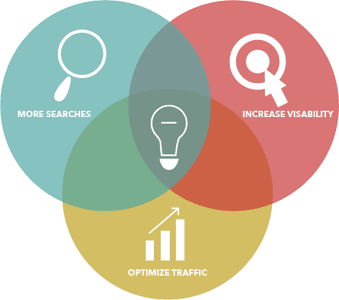
Contextual Advertising is an online advertising strategy that targets a search engine user visiting a content-rich affiliate’s site through keywords and keyword phrases. An advertiser’s ad is then placed on relevant web pages by Pay Per Click (PPC) search engines.
In contextual advertising, a contextual publisher scans a site for keywords and returns ads to that site. Specific ads are shown based on the content a search engine user is viewing. This approach helps deliver highly relevant advertisements to the audience, improving engagement.
It is important to note that contextual advertising is a Pay Per Click (PPC) strategy. It does not produce organic search results, like those developed by a professional custom website design company such as Dynamic Digital Advertising (DDA). To increase visibility organically, combining contextual ads with strong SEO practices and expert website development services is essential.
Different Types of Contextual Ads
There are three main types of contextual ads:
- Separate ads that appear in specific areas on a page.
- Inline or in-text contextual ads, which appear within the body text.
- Pop-up ads that show as separate windows.
Some well-known contextual advertisers include Google’s Adsense and Overture’s Content Match. Inline contextual advertisers who invest heavily in PPC advertising can secure top positions in the “sponsored listings” section of a search results page.
In contrast, in-text contextual ads appear directly in the body text. Users can choose to view these ads by clicking on the highlighted link. This method feels less intrusive and often results in better user interaction.
For businesses wanting to balance contextual ads with broader strategies, check out our article on the forthcoming of AI workflows in small businesses.
Benefits of Contextual Advertising
Contextual advertising offers several key benefits for small and medium-sized businesses:
- It helps reduce advertising expenses by targeting highly specific audiences.
- Certain sites, like news platforms and publisher websites, benefit greatly. Their focused content ensures that ads match what the reader is interested in.
- Directory websites are also ideal for contextual ads. Since these directories are organized by category, the displayed ads remain relevant to the user’s search.
For businesses aiming to maximize ad spend and reach niche audiences, contextual advertising provides an effective and affordable solution. For best results, combining this strategy with strong content marketing and SEO optimization is recommended. You can read more about these strategies in this guide from HubSpot.
Pitfalls of Contextual Advertising
Despite its benefits, contextual advertising also has some downsides.
Inline contextual ads typically appear under the “sponsored links” area. However, research shows that search engine users are four times more likely to click on organic search results than on paid ads. For this reason, investing in organic SEO through a professional website design company like DDA can provide long-term advantages.
Pop-up ads are another challenge. Many users find them annoying and use pop-up blockers. As a result, these ads often never reach their intended audience.
Additionally, contextual advertising has faced criticism for using third-party hyperlinking. This practice involves installing software on a user’s device to show links from advertisers who aren’t paying the website to display ads. Such tactics raise privacy concerns and may reduce trust in the website.
Conclusion
Contextual advertising remains a powerful strategy when executed properly. By targeting users based on the content they are viewing, businesses can reach interested audiences effectively. However, balancing PPC with organic SEO strategies, ensuring ad relevance, and respecting user experience are crucial for long-term success.
For businesses considering contextual advertising, it’s a good idea to work with professionals who understand both SEO and PPC. You can explore more insights on optimizing your online presence through Psycray’s digital marketing services.

